#and its only really explicitly described in s4
Text
i love how bsd is a war story that doesn't tell you so until so much later. the war is bsd in overhanging and present in countless pieces of the plot, but it creeps up on you. you hear it in little pieces, a mention here, a mention there, and eventually it's practically omnipresent and the focal point of the arc.
#basically everyone's story (who we know) can be traced to the war#but we didn't even know the war HAPPENED until like three seasons in#and its only really explicitly described in s4#which is so wild#bsd#bungou stray dogs#bungo stray dogs
750 notes
·
View notes
Note
Looking at the episode listings now & Season 3 just gets more tragic, cos from Chloe's perspective its like this:
Mums back, but still hates me (Killed me) but hey I can be a super hero cos destiny, chance, choice whatever!
Oh no, I messed up being a super hero, was humiliated before everyone and... Well at least mom seems to like me now?
Followed with, well everyone hates me and I'm useless I might as well leave, oh gosh Ladybug thinks I can be good and useful & chose me!
Capped off with, I helped Ladybug and the rest of the team battle an army of Akuma, we almost defeated Hawk Moth and even had a team photo!
Like, yes I know you know all this, sorry, but like...
From her perspective at the end of season 2, she had zero reason to think she was not on the team.
Then its months of radio silence, rejections and battles at her door.
Still, she tries at times, like with Star Train, even if no one takes her seriously.
Then she's targeted by the villains & almost manages to defeat Hawk Moths second in command but is told she can't be hero anymore.
Followed very shortly afterwards by her parents declaring she only loves herself, attacking her and Ladybug choosing the only other hero with a known identity & then Hawk Moth ambushing her.
Again you know this, but it really does just emphasize the tragedy to me.
Now,
I am sure there will be someone who will go, "She's not owed a Miraculous" and sure, but frankly no one is owed super powers. Or, "Marinette is not obligated to help improve a girl who is always awful to her." Again, fair in concept, but here's the issue.
As I noted elsewhere, she already was chosen to use a Miraculous several times, as in sequentially there were no massive gaps that would give her the impression this would be a rare or one off thing.
Thing is, as only Ladybug is making these calls & chose her each time despite their history it is Ladybug's job to tell her that it was never going to last. Or at least order someone else too, or to have opted against choosing her again in the first place.
& as for Marinette, well again, she wasn't obliged to try and fix the family situation but she chose too. We can argue about whether it was in character to try, or the method she picked was out of character.
But within the context of the story, she did opt to insert herself into the this situation. It feels disingenuous to then turn around and say she can just divorce herself from it. If nothing else, she should maybe like... Tell an adult?
Like, its for sure a messy situation.
I'm not blaming Marinette for how messy it became but I do think its fair to note how this would look from Chloe's perspective without Marinette or our audience context. IE, her beloved idol who she's given adoration & obedience told her she could be a good & useful hero; then dropped her for months, & seemingly lied about why.
I also think its fair to note that regardless of whether it was the personally logical or morally right choice, Marinette did choose to involve herself of her own accord. Even suggesting involving Chloe could make her a better person! So people acting as though she's, at the very least, not involved at all is just feels disingenuous ya now?
The Season 3 finalé sets up so much for the folks who believe S4/5 was a retcon as opposed to plan. I don't think it was a retcon, but I DO believe it was a betrayal of the narrative before that point.
The S3 Finalé frames Chloé's fall *explicitly* as a tragedy. Fu uses the phrase 'Some lose hope' to describe her situation. Losing hope isn't an act of evil, it's an act of desperation and defeat. In a greater sense it is also framed as a failure of *Ladybug*.
Because no matter what people want to say about Marinette's duty to hep, *Ladybug* does have duties and responsibilities. On her watch a child was isolated and broken down over several episodes by Hawkmoth and Mayura. Season 3 starts the pattern of Ladybug failing with every Finale *Which is a very weird story to write!*
Now, the S3 Finalé would have worked as a low-point/mistake for LB to circle back to and address shortly after. Have her find out about Hawkmoth/Mayura's manipulation, about Queen Bee confronting Mayura and rejecting her. About her rejecting an akuma before anyone else. Have Marinette discover that things are not what they appeared on the surface (come on this is a classic theme for superheros!) and institute a process of mending fences. Ladybug grows from the experience, Chloé clearly will have growing to do too. In the end though the abused child is heard, and healing/help is given.
Instead they just went with 'nah ignore all the setup, Chloé is just evil, always has been, she is actually the abuser not her parents, and she deserves it.' (A statement Thomas wrote into S5E23 which was removed in production without his knowledge)
So yeah, no wonder people think it was a retcon. There's no world where the reality makes sense.
24 notes
·
View notes
Text
Hawkins being somehow special when it comes to a connection to the UD is so fascinating. These are all theories on my part, obviously anything could go any way but:
I feel Henry got his abilities from the MF. For some reason it contacted him when he arrived at Hawkin... imo I don't think there's anything Inherently Special about Henry, but I do feel like the MF contacted him because Henry had the potential to come up with the plan of connecting the UD and RU (rightside up) and the anger/determination to go through with it. I mean, Henry gained his abilities and then immediately began to exhibit very disturbing behaviors eg. killing small animals.
This really isn't a "the MF is the big bad" theory, moreso I think the MF knows it doesn't have the capabilities to invade the RU on it's own, so it uses Henry as the means. A bit like a parasite, I think. Henry's actions are all his own (tbh I think that if they weren't it would undercut the overall message while not taking away from the nuance of Henry's experiences/motivations. Just my opinion!) but the MF did provide a bit of a nudge in that direction by supplying him with the abilities and allowing Henry to shape him.
Of course there's the question of why Henry and why 1959 of all times for the mindflayer to make a move. It's interesting that in S3 I believe Alexei (please correct me if I'm wrong I hate rewatching I'm just going off what I remember) stated that they tried to establish a portal in Russia but it didn't work. It only worked in Hawkins. The implication there that Hawkins has a connection or a thinner barrier between it and the UD than other places. And obviously, that could be why it was able to contact Henry on its own in that way, after Henry arrived in Hawkins. The MF cannot normally make contact with the RU except in these extraordinary circumstances, and it pounced on it.
Of course then that gets me thinking about why there is such a thin barrier between Hawkins and the UD. And again the question of why wait until 1959? Why Henry in that specific time?
The barrier between Hawkins and the UD not always having been as thin as it is in the present time I think explains it, if the premise I'm describing is accurate. Something happened to thin it out, something perhaps that happened within a decade of the Creels moving into Hawkins. Was the Hawkins Lab already established there when the Creels moved in? What was Brenner studying there before he got a hold of Henry?
His handling of Henry was also a bit sus to me honestly. As far as we know Virginia told him her son needed to be "fixed". What Virginia knew about Henry's abilities is still up in the air but we have no reason to believe that she knew anything beyond her most likely usual blaming of Henry whenever anything went wrong as the "problem child". So what information she relayed onto Brenner probably didn't have much supernatural context to it. So why Brenner, a scientist who as far as we know wouldn't have much more context about Henry than Virginia herself did, swoop in and scoop Henry up and take him to the lab before he woke up from his coma? Why didnt he, just like everyone else, believe it was Victor Creel who did it and he just was never able to finish off Henry?
What I'm saying it, there's a lot of logical jumps Brenner wouldnt have done here if he wasn't already aware somewhat of the UD and psychokinetic abilites. It's not everyday you kidnap a troubled kid who was going to be your patient.
MKUltra, named explicitly in the show, started (allegedly) in 1953... before Brenner got a hold of Henry. But also Brenner is in his mid 50s in s4, so he would only be in his early 20s when MKUltra began so him being involved that early on is unlikely.
Government scientists could have already been looking into psychokinetic abilities in Hawkins much earlier than even Henry moving there. It could be that something happened, unintentional or intentional, to chip away at the barrier between the UD and the RU, making it prime for the MF to take advantage of when Henry moved in. Hell, maybe they could even have been looking into the UD itself and the MF.
It's all up in the air at this point but that my flimsy theory lol.
2 notes
·
View notes
Text
This feels obvious in hindsight, but as we begin our rewatch, I am struck by the thematic resonance of the cases over the first three episodes. Makes sense. There are a lot of character and story dynamics to lay groundwork for. I guess I was too focused on the monster-of-the-week framework to really notice.
To start, the pilot deliberately positions the Woman in White and Mary Winchester as opposite sides of the same mother coin, even going so far as styling them in similar clothing. You almost wonder if Dean might have first mistaken the Woman in White for his mother. Especially when he and Sam were talking about her just before the Woman in White appears in the distance on the bridge.
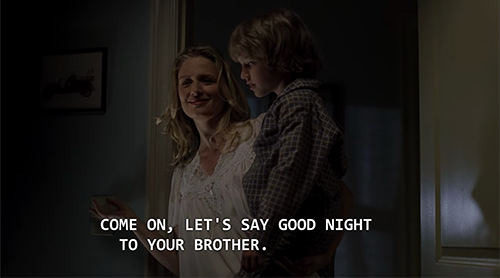
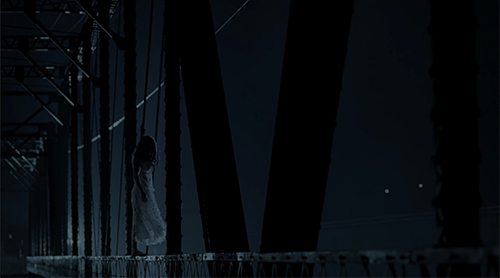
But the Woman in White serves as more than just an example of a “bad” mother compared to Mary’s example of a “good” one. She seems more of a cautionary tale for and about Mary.
Sam explains that the Woman in White is the ghost of a mother who murders her children out of temporary insanity brought on by her husband’s infidelity. Almost as if she kills her children in a deluded attempt to protect them from the trauma of a broken home.
We do not know if John was ever unfaithful to Mary—although S5′s “Dark Side of the Moon” reveals their marriage had its ups and downs—but he does theoretically break their home by raising their children as hunters after her death. What might Mary have done to save her sons from this fate? A fate a younger Mary describes in S4′s “In the Beginning” as “the very worst thing” she can think of? Sam asks Dean if he thinks “Mom would have wanted this for us” and the answer is clearly HELL NO.
If the pilot uses its case to telegraph mama bear Mary, then 1.2 uses its case to signal the the ride-or-die bond between Sam and Dean. And how that bond developed in their parents’ absence. Amid their search to find John, our boys meet Haley and Ben: a couple of tight-knit siblings making it on their own. “Our parents are gone,” Haley explains. “It's just my two brothers and me. We all keep pretty close tabs on each other.”
Sounds pretty familiar to me. Apparently to Dean too. More than once, he expresses sympathy for Haley’s eldest sibling determination to find and rescue her younger brother Tommy. And after Dean and Haley get taken by the monster, Sam and Ben step up to demonstrate their own selfless commitment to their respective siblings.
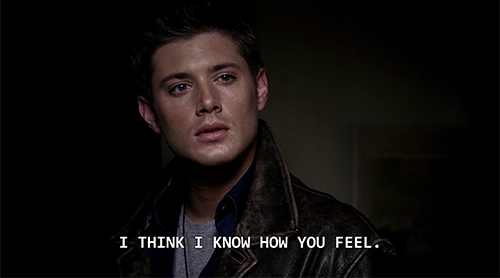
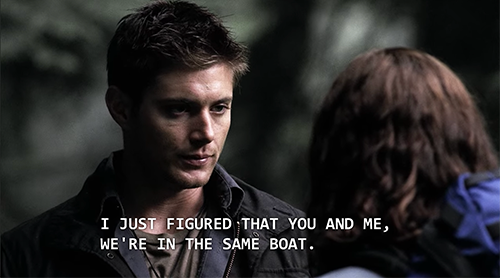
“Dead in the Water” completes the family portrait by telling us more about John. Or, more specifically, how his sins put the lives of those he loves at risk.
Sheriff Jake Devins and Bill Carlton drowned their childhood friend Peter Sweeney, and now Peter’s spirit similarly targets their children and grandchildren. With young Lucas in jeopardy, Sheriff Devins offers himself in exchange for his grandson, satisfying the ghost’s revenge.
Does John not broker the same trade to save Dean in S2′s “In My Time of Dying”? And does he also not make that trade out of not only fatherly love but also as a means of atonement? Atonement for how his relentless demon crusade endangered his children? “You care more about killing this demon than you do saving your own son!” Sam accuses John in “Dying.” “It’s the same selfish obsession!” Dean should not suffer the consequences of John’s sins anymore than Lucas the Sheriff’s. And like the Sheriff, John ultimately agrees.
John is of course not the only Winchester whose emotional journey is reflected in the circumstances of the case. Dean’s is arguably even more apparent, with him explicitly relating to Lucas over their shared traumatic experience of witnessing a parent die.
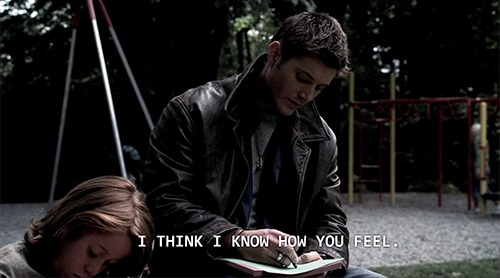
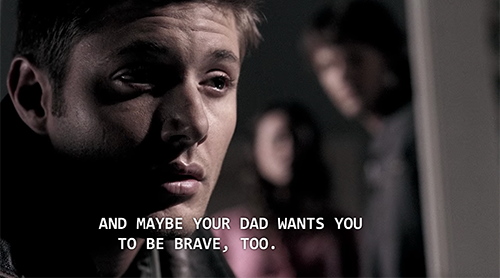
But the resolution of Sam’s fraught paternal relationship is hinted at too. In speaking one-on-one with Sam, the Sheriff’s daughter Andrea concludes, “Dad loved me. He loved Lucas. No matter what he did, I just have to hold on to that.” Sam shares a similar sentiment with Dean just a few episodes later in “Bugs.” “I want to apologize to him,” he tells Dean. “All the things I said to him. He was just doing the best he could.”
#supernatural#mary winchester#dean winchester#sam winchester#john winchester#pilot#1.1#1.2#dead in the water#1.3#s1#our meta
18 notes
·
View notes
Text
another round of asks: keith
This feels like one of those things where you type ‘keith is’ into google and see what comes up.
Keith is a self-insert
Keith is on his way to becoming (a) god
Keith is destined to be emperor
Keith is friends with Lance > Keith is friends with Shiro
Keith is over Shiro [ + kills Sendak]
Behind the cut.
Keith is a self-insert
I have no proof for this but I think that a majority of VLD’s writing staff are secretly making Keith their self-insert character.
It’s an amusing idea, but it’s very hard to do that when it’s a collaborative exercise like writing for television. Ostensibly collaborative, that is, ‘cause hell if I know at this point whether anyone has say beyond the EPs, but more on that in another post.
I’ve never heard of anyone in the deciding-level staff (the EPs or the writers) say that Keith is their favorite. JDS is clear that his personal favorite is Lance, and LM’s been known for being pro-Pidge since the beginning. Early on (like S1), Hedrick’s on record saying that it mapped nicely, since he felt the most affinity for Hunk in some ways, but that’s not what I’d call a preference in the same way as I’ve seen JDS and LM speak of their favorites.
More likely Keith is not a self-insert so much as a kind of every-hero. It’s really quite remarkable --- given how much the EPs are so blunt about their dislike for Shiro --- how the story events, put together, could be seen as split almost evenly between them. To the point we had nearly two seasons where they were never in the same room together, never exchanged any words, nothing. Like matter and anti-matter.
To put it bluntly: by S7, Shiro pays the price, and Keith gets the rewards. We didn’t get to this point overnight; in S1/S2, it was split a bit more evenly, and the rest of the team had some share in the prices and the rewards, too. But that concept of an ensemble cast got tossed out the window to lie dead on the highway tarmac, somewhere around S4.
The thing is, a character needs a conflict, needs an obstacle, because failing (and suffering the consequences) and trying again (and growing from it) is the only route to character development. And that’s been almost criminally denied to Hunk, Lance, and Pidge (and since S3, Allura). Their paths have been continually softened, if not truncated outright.
I was noodling around last night, and this quote jumped out at me: ‘Dos Santos says they did think Pidge deserved a happy ending. “We wanted Pidge to have the true reunion she deserved...”’ They did the same for Lance and Hunk, whose families also survived. But what about Allura? Is her happy ending just Getting A Nice Boyfriend? Where’s Shiro’s or Keith’s happy ending?
The result is that the story’s necessary conflict and tension --- because it must be there, or we’re all just watching paint dry --- gets shifted to Keith and Shiro. And with the bulk of that conflict landing on Shiro to suffer all consequences while Keith gets all the hero moments... it’s no surprise Keith might feel like a self-insert, since that treatment usually correlates.
But I think it’s less self-insert, and more that with Shiro taking on all the EPs’ dislike, there’s not much left for Keith to do.
Keith is on his way to becoming (a) god
At this rate, Keith will turn into god by the end of the show (like madoka, space dandy, and oban star racers), with all the stuff that gets handed to him, it doesn’t seem far-fetched anymore.
Okay, that’s out of left-field, but... it might actually improve the story if he turned out to be a long-lost twin of Haruhi Suzumiya (though I would totally dig if it were Haruhara Haruko instead, but only if the Atlas turns into a giant iron).
With the way Keith's quintessence sensing came to the forefront several times this season, I still wonder (and fear, a little) about the possibility of him being part Altean. Even if there is a slim out with learning the druids were Galra, the focus on Alteans still has me worried that the last season will overlook Allura and Romelle in favor of having Keith develop druid powers and learn his connection to the Alteans.
Thing is, we’re so far along in the story that I don’t expect any of the odd abilities to ever be explained --- anymore than we ever got an explanation as to why quintessence reveals a skin tone Keith’s never demonstrated since, at least not to the same striking degree. And truth is, I don’t think the EPs know. I have a strong suspicion there was a lot of groundwork laid in the first two seasons that have since been abandoned. So I don’t expect it to fit together, in the end, and would not be surprised if everything’s hand-waved.
So who knows.
Keith is destined to be emperor
People are speculating on Galra emperor Keith (partly because he’s apparently magic now). Would explain why this season pushed Keith as leader... even though he never wanted to be a leader. And the leadership arc wasn’t really natural to his character. Also, whatever happened to democracies?
Emperor? Because magic? I mean, wouldn’t that make Allura a better candidate? I know, it’s so easy to forget she exists, now, but she did have a line or two this season. (Okay okay I kid, she had maybe a half-dozen.)
I really don’t know. When I put on my writer’s hat, Keith’s entire arc really doesn’t make much sense. He spent way too much time in S2 and S3 protesting and fighting ever being a leader, and I have no idea how he got from that point to S7′s sudden undiscussed and unquestioned acceptance of the role. If there was development there, I would’ve liked to have seen it.
Because without that, it’s still hard to look at the character onscreen and see it as the same person. Maybe they are setting up Keith to be emperor. I have no idea how that logic even works. Of course, seems like logic left the building about four seasons back but go off I guess.
That reminds me of the teaser version that used to be all over the place --- and now I only see on the Google results --- that closes with “to conquer the Galra Empire.” That’s a rather specific word, compared to, say, “overthrow” or “defeat” or “end.” Conquering is what you do when your plan is to take over, after all. Maybe the idea of Emperor Keith isn’t that out-there. Hell if I know.
As for democracies... well, the EPs have never mentioned influences that’d make me think genre political savvy (ie Gundam, Code Geass, Gasaraki, etc). Probably easier to have monarchs: one Puigian leader for the entire planet.
Earth does get to be the exception there... with a social structure that appears to rest entirely in the quasi-military hands of the Garrison. Was there even a single civilian present, as the obligatory elected spokesperson for the people? Pretty sure there wasn’t. (This is not unique to VLD; we have the same discussion on a regular basis in the SFF community about the bizarre prevalence of monarchial systems in American-written SFF.)
Keith is friends with Lance > Keith is friends with Shiro
There were scenes which would be v sweet for Keith and Lance if they weren't explicitly there to prove how useless Shiro is, and many to show how useless KEITH thinks Shiro is, and that’s why Keith took [Shiro’s] place. [Before S7] ... Keith wouldn't step on Shiro like that, take Black and his place in the team and his healing away from him. But S7? Behold the new Shiro and Keith dynamic. Keith choosing Lance to lead while Shiro’s right there? Roger that team leader SHIRO’S RIGHT THERE! +Sendak thing?
@sassafrassrex did a meta on the Sendak-Shiro fight that’s a must-read, so I won’t repeat that here. As for the rest... I mentioned above that Keith felt very unlike himself this season, and his dynamic with Shiro --- or complete lack thereof --- was a big part of it.
After all this time, we’re overdue for seeing a solid friendship between all the paladins, and that includes Keith and Lance. Most of what I saw felt... well, uneven would be the best word. S1/S2 at its best, between them, was more of a good-natured teasing. S7 felt harsher, to me, as though it was Keith’s turn to be the asshole.
More than that, though, is that it almost feels like the writers can’t figure out how Keith could cherish Shiro and yet have other friends --- so instead they chose to highlight Lance to the near-exclusion of Shiro. And that’s no better for Lance, either, because again he’s just a substitute.
Frankly, I’m tired of Lance always ending up with someone else’s leftovers.
Keith is over Shiro
They really had Keith kill a version of his most important person in the world (who he thought was Shiro) so he can rise as BP, then toss Shiro aside as broken, even choosing Lance as right hand over him. *And* to pick the one who abandoned him twice -- and at the end were [framed as a] “family" with Kolivan -- over Shiro who never gave up on him. Krolia even got an I-love-you *and* got called Mom for leaving. What fucked-up messages, lemme tell you, as someone who relates to Keith.
Put like that, it is pretty brutal. Not sure how else to read how completely Shiro is excluded from the narrative for the first 3/4s of the season, down to being literally frozen out --- and it’s most striking of all considering this is Keith we’re talking about. The one even the EPs describe as being so devoted to Shiro that he’d never dream --- let alone be capable of --- walking away (though the co-dependent note in that description skeeves me out some)... and then S7 starts and after the first episode, the two barely exchange any words.
This was the one person Shiro was always vulnerable with, and Shiro was the one person Keith relaxed around. While yes, the team is way way overdue for doing that with each other beyond their original dynamics (and what I wouldn’t give for some real friendship-bonding between Allura and Keith, damn it), the complete absence made the season feel hollow.
Just as Lance’s and Hunk’s friendship provided heart in the early seasons, so did Shiro’s and Keith’s. The absence of that, in S7, was nearly palpable. And it did make Keith look like someone who’d taken a long hard look at his best friend and decided Shiro was no longer worth it. This is the character who’d go back for a colleague even when the clock is ticking, who didn’t want to see Thace sacrifice himself, or see Regris killed, and went to the ends of the universe for Shiro? What wouldn’t he do for a friend? Unless, of course, that friend was killed, cloned, and brought back broken.
It comes down to two possible explanations: one is that the writers genuinely don’t know how to balance Keith’s devotion to Shiro while also letting Keith connect to the rest of the team. I’m having trouble believing they’d be that clueless about how friendships work, though.
The other possibility is that we didn’t quite get the entire story when JDS said there’d been two versions of S6. I think what we’re seeing is the original script and storyboards for S7, leftover from when the EPs pitched a version where Shiro died at the end of S2 and never returned.
The reason might’ve gone like this: we need N hours to sit down and write S7 with Shiro as Black Paladin (as they would for any other season). But if we just re-use the original storyboards with Keith as Black Paladin, we’ll save X dollars. Just edit a little to add Shiro, plus we’ll have the cash freed up to do [some set piece] so it’s really cool.
JDS pitched the Atlas as the awesome and amazing consolation prize for Shiro, according to recent interviews. He might’ve argued the cost-cutting step would also let them expand Shiro’s role in the finale.
My guess for the reason why Keith was the one to kill Sendak (besides the writers hating shiro and Keith needing to resolve every plotline himself now) is that Shiro killed Zarkon, the first major villain, so maybe that was one of their reasons to give that kill to Keith.
I was pondering that until I got to thinking about why the execs would reverse course and allow the EPs to shelve Shiro. I think that’s the reason Keith kills Sendak: it remained from the original storyline, where Keith took revenge on the person who’d tortured Keith’s best friend. Which in Shiro’s absence would’ve been powerful. In Shiro’s presence it’s... demoralizing.
Bottom line: execs love cost reductions above all else. (Newsflash: DW is a business.) Given how the execs have consistently been described as pro-Shiro, cost is the only thing I can see convincing them otherwise. Especially if the series has already hit budget overruns from rewrites and redoes in previous seasons --- and if they’ve done this before to save money, by pasting Kuron where Keith would’ve been for most of S3-S6.
That would explain why Keith doesn’t seem to even notice Shiro for most of S7. Because when the script was written, Shiro wasn’t there.
note: it might also explain the EPs’ hints at a spoiler, but I’ll leave that wild speculation to @ptw30 to explain.
123 notes
·
View notes
Text
What happened to Sherlock? Part I: Blog vs TV Show
This is the first part of my attempt to ‘test’ a series of hypotheses and predictions about BBC Sherlock and specifically what happened to Sherlock in the show. I’ll try to do it using Sherlock’s method, ‘the science of deduction’. You can read about this method, and about the general scientific method, in the introduction to this meta series, where I also suggest that we – the audience - are supposed to figure out what happened to Sherlock. The game is on! ;)
In this Part I, I’ll go through the first of the total nine hypotheses I’ve proposed in the introduction, and it concerns John Watson’s official blog in comparison to the BBC TV show Sherlock.
Hypothesis 1: John’s blog is the most truthful account of the actual events
After what happened in TBB John seems rather eager to stress on his blog that he’s not Sherlock, and vice versa:
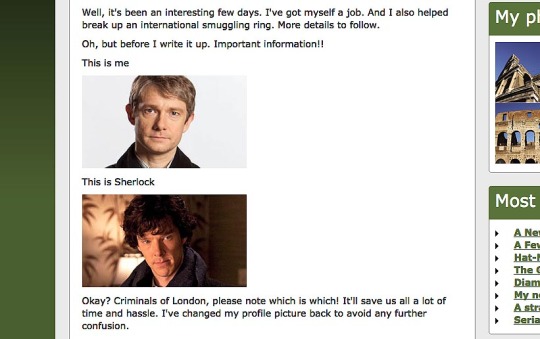
And I agree; I think it’s important to realize that we have two different narrators of the events connected to BBC Sherlock. To analyze my hypothesis above, I’ll make a couple of testable predictions based on it, and also based on some general deductions from my own textual reading of the blog vs the TV show. And then I’ll test these predictions by gathering more data - more observations – to see how they fit with my predictions.
This is a long meta, so I’m leaving the main part of it under the cut.
A part of the inspiration for hypothesis 1 is this recent meta by @hawksmoor17. Here’s an excerpt:
“i find it slightly humorous that john is seen as the ‘storyteller’ of the duo when really sherlock is the one to come up with lines such as “sentiment is a chemical defect found in the losing side”/”i may be on the side of the angels, but don’t think for one second that i am one of them”/”heroes don’t exist, john, and they did i wouldn’t be one of them” etc., in his usual dramatic fashion whereas the writing in john’s blog is … honestly not so good. what sherlock pretty much describes as ‘and then this happened, and then this happened, and then this’”
I agree with @hawksmoor17; John’s blog description of the events isn’t exactly a literary masterpiece. :) But that doesn’t mean it isn’t at least roughly accurate:


(I’ve cut out John’s description of Sherlock here, so we can focus more on his actual account of the events)
The interesting thing with the blog vs the show is that they are two different narratives of the same events, expressed through two different media. Since these are two versions of the story, I believe one of them can be used to test the accuracy of the other.
My first impression of John’s blog was that it was some kind of complement to the show, produced to make the show seem more ‘alive’. The blog is complete with John’s blogposts and input from other characters of the show (and also characters that haven’t appeared in the show this far) in the ‘comments’ section. We, the audience, can’t comment on it, though. But, parallel to the TV show, we can all follow the textual accounts of Sherlock’s and John’s adventures. Parting from the reality of the show, John has made brief accounts of what happened and shared with the rest of us - at least that was what I thought at first.
But what if it’s the other way around? What if the blog is actually closer to the ‘real’ story, and what we see in the show is someone’s very personal interpretation of it?
Regarding ACD canon, there has often been a discussion about whether John Watson, as Sherlock Holmes’ chronicler in The Strand Magazine, is a reliable narrator.
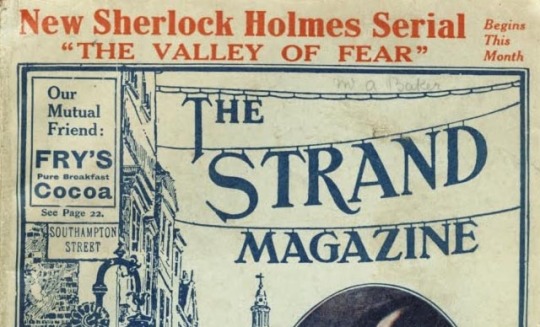
(Picture source here: X)
The speculation has been that things described in The Strand just might not have happened exactly the way Watson tells them. Sometimes Watson even says himself that he must hold back certain information due to consideration for the people involved. But that could happen to any narrator, right?
So - how reliable is John Watson as a narrator? I think that’s very difficult to say, and it certainly depends on what you compare his stories to. Here’s an interesting discussion about this by @bakerstreetbabes. An excerpt: “One important thing to remember when talking about Watson is that all first-person narrators are unreliable, period, because they are limited to their own perspectives and biased by their own inclinations and affections. You and I see things through our own eyes; we are all thus unreliable narrators”.
Testing process, fueled by more observations:
I think what we need to find out is not whether there is a completely reliable source for modern Sherlock’s and John’s doings – I believe we already have that answer: No, there isn’t. My first question to analyze is rather:
Which of these two versions is the most truthful – the blog or the show?
So, let’s start making predictions from hypothesis #1 about the blog’s accuracy.
Prediction 1: If one of the versions were more close to the truth than the other, the less truthful one would refer to the other, but not the other way around. If hypothesis #1 were true, then the blog would be referred to in the show, rather than referring to the show.
Observations:
John’s blog is referred to many times in BBC Sherlock, as if it was real. For example the royal family seems to be reading John’s blog:
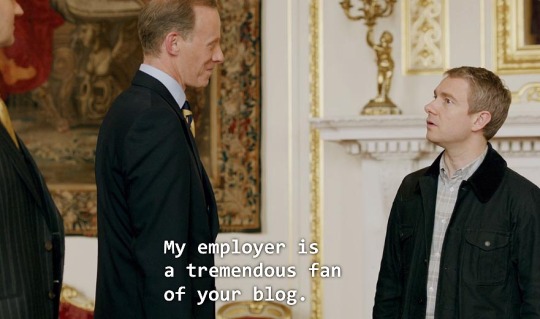
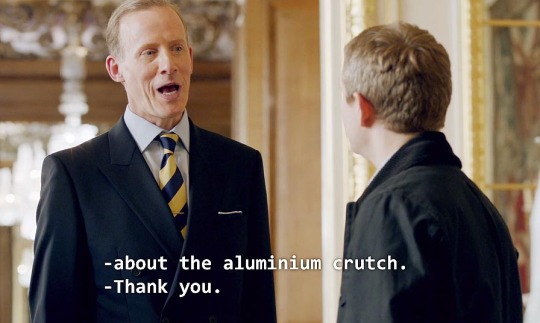
And people who later turn out to be ‘bad guys’ also seem to be very attentive of the blog:
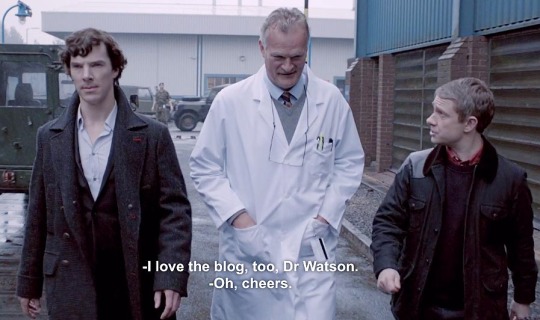
And one case is repeatedly referred to as being published on the blog, but we never get to see it in the show:
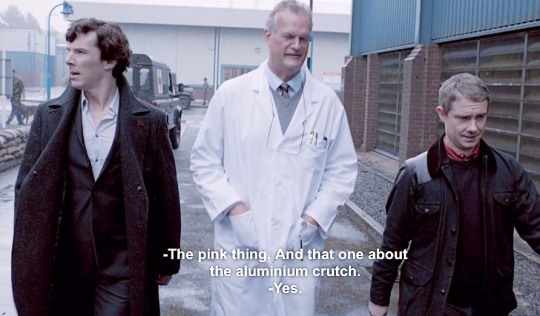
So actually, if we count the number of cases, the blog has more content than the TV show. Three of the blog cases that John gives a full account of are never even referred to in the show or anywhere else than in the blog: The Deadly Tealights, Death By Twitter and Murder at 'The Orient Express'.
One blog case is referred to by two other characters in the TV show; The Aluminium Crutch (see pics above), and some cases are shown extremely briefly: The Geek Interpreter and The Speckled Blonde. Some of the others are only shortly re-counted by Sherlock in his best man-speech at John’s wedding: The Inexplicable Matchbox, The Poison Giant, Happily Ever After and The Hollow Client. The Bloody Guardsman and The Mayfly Man are given more lengthy descriptions in TSoT, assumably because they were relevant to the events at John’s wedding. In one case - The Six Thatchers - is the TV Show events (in S4,T6T) almost entirely different from what John describes on his blog, except for a few common factors.
In fact, many things in the show circle around the blog. And for us, the audience, the blog is perfectly accessible. At least I believe that today most people who have access to television also have access to the Internet in one form or another. Which means that both of these channels are valuable tools to understand BBC Sherlock.
In the show, Sherlock doesn’t always seem to be very happy with what John publishes on his blog ;)
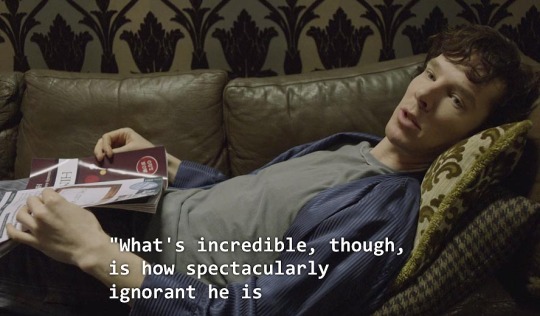
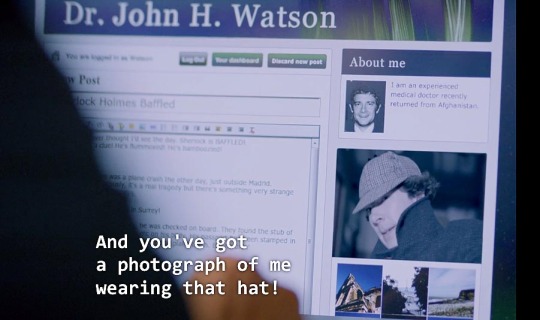
But at least he totally acknowledges its existence.
On the other hand, John’s blog never refers to any kind of other account of John’s and Sherlock’s adventures that could be expressed by a TV-show. And the TV show is never referenced by the blog in any sense. However, ever since the blog stopped updating a couple of years ago, there’s been a cryptic, general message stuck on it – apparently not written by John - that refers to BBC’s website:

It seems like the BBC has now closed one of its two official media that tells us about the modern Sherlock Holmes. But they still refer to John Watson as if he were a real person! And strangely, in Series 4 of the TV show a series of blog cases are referred to, and we can see John typing away on his computer, but these have, up to date, never been published on the blog that is accessible to the audience. And - as many have noticed - John isn’t actually seen typing on a real blog site in T6T; it’s a jpg-file!
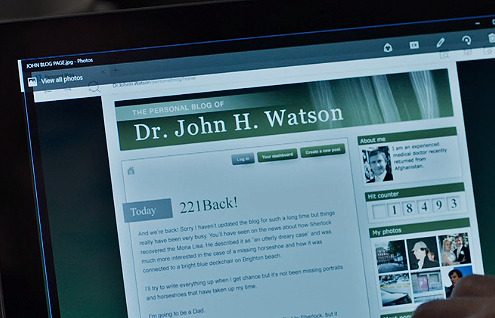
The truth is, so far as I can see, that John stopped updating his blog after the stag night but before his wedding in TSoT. After that, there’s only one more post published, and it’s written by Sherlock! (It is, however commented by John and ‘Mary’).
The blog tells us about events that are supposed to have occurred in ‘reality’. But nowhere does it say that this reality is accurately reflected or presented by the TV show. The latter is only inferred by the sign above, but not actually spelled out. In fact, I’ve never heard any of the show-makers explicitly say that what we see in the TV show is supposed to show us Sherlock’s and John’s ‘reality’. The TV show is treated like just another medium that gives us ‘content’ about Sherlock Holmes. For all we know, the TV show can be a subjective dramatization of the basic events described in the blog.
Deduction 1: If these premises are true, then the blog seems to give us a more accurate account of the ‘truth’ than the TV show, because that’s where the references lead.
But this is just a first indication based on a single prediction – we need to collect more data and make more testable predictions to get to a more solid conclusion.
Prediction 2: If one of the versions is more close to the truth than the other, the most truthful one would be the one that has less exaggerations.
Observations: I’ve always thought, automatically, that BBC’s TV show Sherlock would be the equivalent to Watson’s account of their adventures in The Strand in ACD canon, that what we see in the show is the story as told by John Watson. But when I think about it nowadays - especially after S4 - I really don’t feel sure of this any more.
If you try to follow a reasonably coherent story about Sherlock’s and John’s doings, John’s blog posts mostly offer a more lucid picture than the show. In the show we often jump from scene to scene, and Sherlock’s mind palace deductions are mixed up with what I thought was supposed to be the ‘real’ events occurring in the story. In short, there’s a lot of insights to Sherlock’s thought processes in the show, that we don’t get access to on the blog. And I’m not just talking about S4 here; I mean the show from the very beginning. Therefore, the TV show appears to be presented much more from Sherlock’s POV, while the blog is almost exclusively presented from John’s POV. (The exceptions are, of course, all the blog comments from Sherlock and others plus Sherlock’s own final post).
I’m now going to briefly compare some events from the TV show, up until TSoT when the blog stopped updating, with how they are described on John’s blog.
ASiP: John’s account of the taxi chase goes like this:
Across the road, we saw a taxi pull up. We ran out, but it drove off. Sherlock insisted on chasing it and luckily he seemed to have an intimate knowledge of London's backstreets. Of course, as I realised afterwards, he's probably memorised the London A-Z. We ran down street after street and we managed to catch up with the taxi - only to discover that the passenger wasn't our killer.
This is, however, what we see in the show:
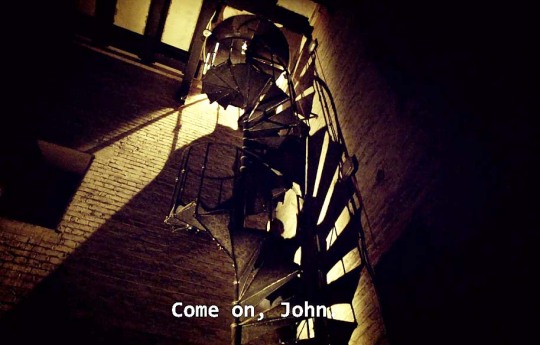
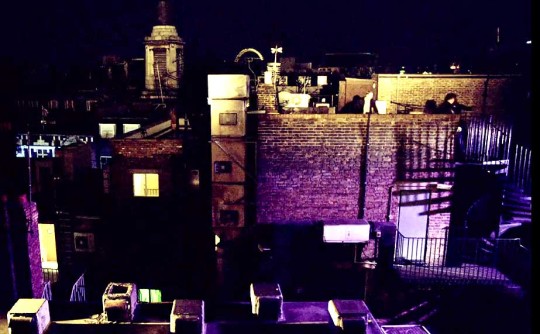
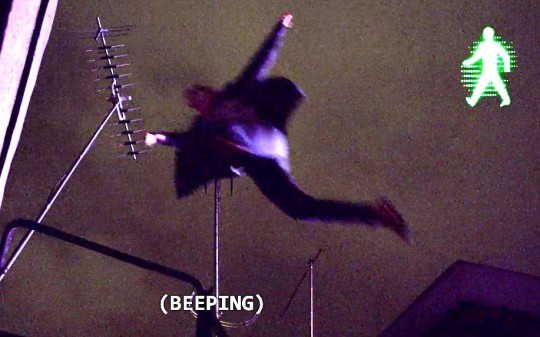
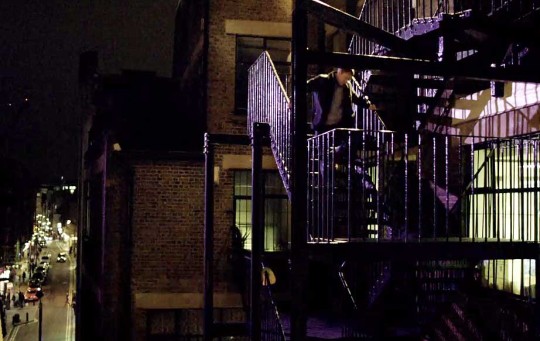
They’re not ‘running down the streets’ to catch the cab in ASiP - they’re running up on rooftops, jumping from one building to another. John, who has been hospitalized for months after his shot wound in Afghanistan and has had a psychosomatic limp for quite some time, is now suddenly an athlete; someone from an action movie who jumps over the rooftops. That’s a pretty far cry from using the back streets, isn’t it? So why doesn’t John describe this? Wouldn’t it sound cool and impressive if he did? And they were not exactly breaking the law by using fire stairs, were they?
ASiB: This is John’s narrative about the CIA guys coming after Irene’s camera phone at 221B:
“When I got back to Baker Street... Mrs H. She'd been attacked. I've never seen her like that and it struck me again just how close to home this all this. People know where we live. People know who our friends are. But, oh Mrs H, she's so brave. They'd done horrible things to her but she had what they were looking for. She'd not given it up. The things we do for Sherlock Holmes, eh?”
But this is what we get in the show:
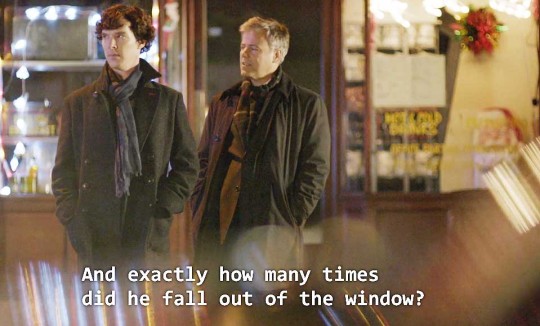
It’s logical, of course, that John would not mention the CIA in his blogpost, due to the National Secrets Act. And not that I would actually put it past Sherlock to take a violent revenge on someone who hurt Mrs Hudson, something that John would gladly fail to mention on the blog. But isn’t it a bit exaggerated even for Sherlock to throw them out of a window from the second floor, and even more than once? I mean, who would survive that? There’s a very obvious risk of this resulting in murder already after the first time. But no-one seems to bother.
TSoT: I really don’t want to destroy the stag night for us, which is one of the few moments in S3 where John and Sherlock actually look relaxed together and are able to spend some time in each other’s company without ‘Mary’ or anyone else present. This is John’s blog description, however:
“We'd just returned from a quiet, civilised evening in the pub when our latest client arrived at Baker Street. She was a nurse. And, apparently, she'd been out for dinner. With a ghost”.
But wait a minute - wasn’t this supposed to be a ‘Stag do’? Even though John says in an earlier post (some 3 weeks before this one) that Sherlock was organizing his stag do, he doesn’t even mention it as such now? Obviously, this description is an understatement from John. A sort of self-censorship. He may have felt a little embarrassed to tell people about when he and Sherlock ended up in a drunk cell and Greg had to let them out, but “quiet, civilised evening”? I have no doubt that they managed to make fools of themselves, and I can forgive John for not wanting to tell us the details. ;)
However, this is what Sherlock supposedly narrates in his wedding speech in the TV show:
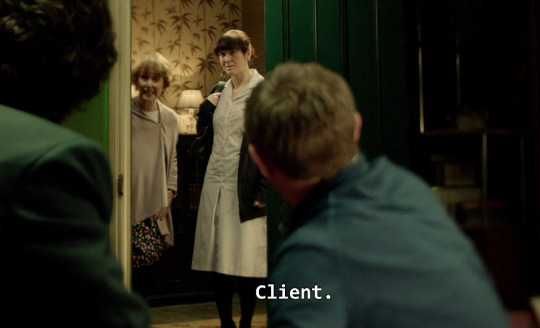
Not that they had stayed very long out on their pub round, but why would someone visit a detective at night, only to tell him that they had dated someone for a single evening, and then this person disappeared? I mean, come on! It’s not murder we’re talking about here (or at least there was no sign of it so far). And why on earth would Hudders let in a client at night when she knows perfectly well that they are celebrating John’s stag night and both Sherlock and John are drunk? She found them lying on the stairs, for crying out loud!
Last but not least, we have another dubious sequence in TSoT - one that I believe is both interesting and of high significance. I’ll get to the significance in my next installment - for the moment just let me point out what’s interesting. It’s about Private Bainbridge in the case called The Bloody Guardsman. This is how John describes it:
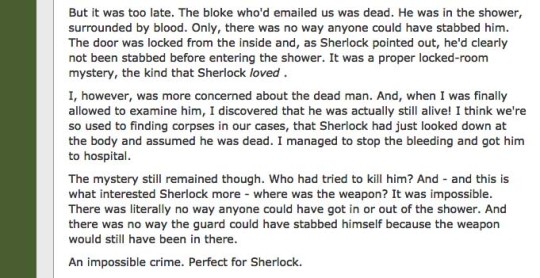
John is then full of glee and quite smug over the fact that Sherlock could not solve this case, and we never get to hear anything else about it from John. But after the wedding, when John and ‘Mary’ are on honeymoon, Sherlock hacks John’s blog and writes a last post on it where he publishes wedding photos. And two days after this, when both John and ‘Mary’ already have told him to shut up, he makes this last comment on his own blogpost:
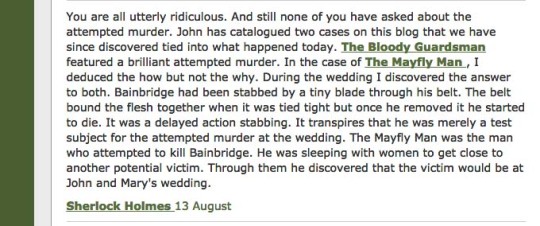
So here Sherlock claims to have actually solved this case at the end of the day. I’m no medical expert, so I can’t really tell if a tight belt around the waist could bind the flesh together enough to temporarily stop someone from bleeding out from a stab wound. But this is not the worst - the most insane explanation comes - as usual - from the TV show:
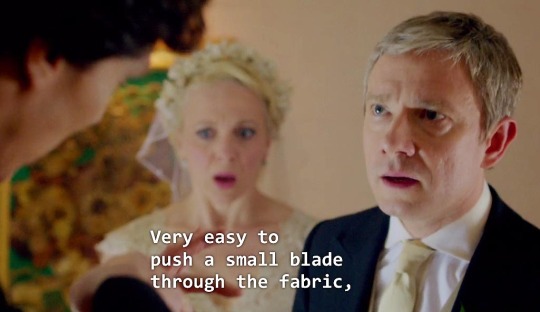
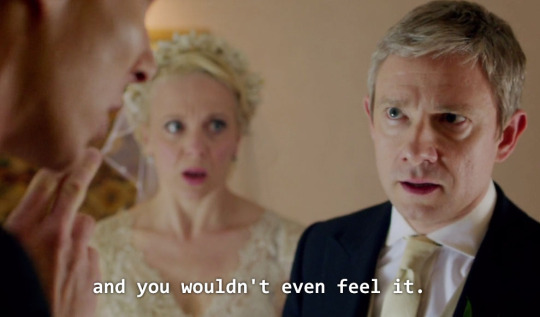
Wait - just wait! This is ludicrous! What have you been smoking (or injecting), Sherlock Holmes? I mean, John Watson may not have Sherlock’s brilliant mind, but he is a doctor!! this is not just an exaggeration - now we’re getting into the realm of the impossible, just like John said in his blogpost above. Even if it were possible - in both the cases of Bainbridge and Major Sholto - to bind the flesh together with a belt, you can’t just backstab someone like that without them noticing, not even with a needle - they would most certainly feel pain!
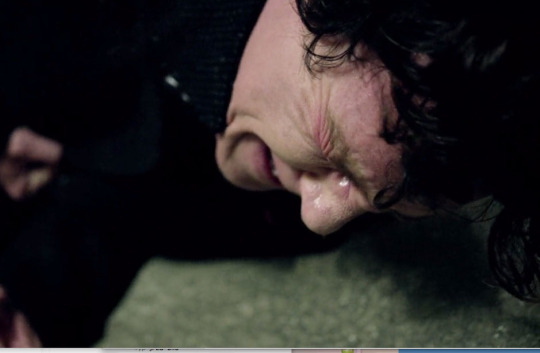
Have we actually been believing this crap only because it’s television?? This is a story about a detective who solves crimes by deduction and logical reasoning! And anyone familiar with Sherlock Holmes will know that “when we've eliminated the impossible, whatever remains, no matter how mad it might seem, must be the truth”.
The only possible scenario I can think of is if Bainbridge was somehow applied local anesthesia before the stabbing, but no-one suggested this, did they?
Conclusion: John’s blog account of these events is rather straightforward and to-the-point (even if John seems careful to keep quiet about some more compromising events), while the TV show appears to exaggerate certain events, dramatizing them into more or less absurd scenes. Thus the more ‘ordinary’ explanation on John’s blog would confirm Prediction 2, which would then mean that the blog is closer to the truth.
Now, you may wonder how I can claim that John Watson’s blog is the most reliable source, seeing as it's full of assumptions and obviously biassed statements about Sherlock. I hope I’m not the only one who is horrified by the way John openly discusses Sherlock’s alleged flaws with the Internet; it’s many times merciless and not something I would dream of doing to someone I wanted to call my friend. And it goes on and on.
But this is something completely different. I think it’s a very common human trait to be subjective regarding what goes on inside other people’s heads - especially if you’re influenced by Sentiment - but still be able to stick to the truth when you are asked to account for a series of events that you actually have experienced. So I’d still claim that John’s description of the events are rather dry and to-the-point, and there's not much room for exaggerations, or speculations (or analysis for that matter lol).
All the events described on John’s blog seem perfectly possible to me; I haven’t found a single one of them that I would deem physically impossible, or even unlikely. What's colorful is John’s descriptions of Sherlock.
So - what is it then, that we actually do see in the TV show? Well, this is precisely what I intend to explore in the next installment, which will be about Hypothesis #2: The show up until John’s wedding is Sherlock re-living their story together in his MP, after reading John’s blog.
Tagging some people who might be interested (please tell me if you don’t want to be tagged):
@sagestreet @sarahthecoat @ebaeschnbliah @tjlcisthenewsexy @gosherlocked @monikakrasnorada @mrskolesouniverse @fellshish @darlingtonsubstitution @88thparallel @raggedyblue @kateis-cakeis
125 notes
·
View notes
Text
Anna, Grace, and Humanity
(note: I’d written about a thousand words of this post when my laptop suddenly rebooted without warning and ate the entire thing. This is my post-screaming-fit attempt to recreate it. This time I’m typing it in a google doc because autosave is my friend… I should really do this more often and stop playing so fast and loose with typing directly into tumblr posts, especially on long posts…)
I know I’ve written a metric ton of stuff about angels and grace and souls. I’ve got multiple tags for all of these things. I just rewatched 4.10, though, and realized just how Anna’s situation has served as the exemplar for how all of this functions within the entirety of canon. Despite a lot of exploration in later seasons that may seem to tinker with these fundamental ideas about exactly what grace is, I think that these essential facts still hold true. Even through what we later learn about Chuck creating the angels and human souls, the nature of Free Will, and what happens to Cas in s9 after Metatron removes his grace, and what happens to Metatron after Cas subsequently removes his grace. All of that still firmly fits within the framework of everything laid out in 4.10 about angels and identity and what grace actually is.
Sam: Wait a minute. I don't understand. So, angels can just become human?
Anna: It kind of hurts. Try cutting your kidney out with a butter knife. That kind of hurt. I ripped out my grace.
Dean: Come again?
Anna: My grace. It's... energy. Hacked it out and fell. My mother, Amy, couldn't get pregnant. Always called me her little miracle. She had no idea how right she was.
Grace… is energy. And whatever makes Anna who she is-- for lack of a better word, her personality-- her memories, her thoughts and feelings, her emotions, her very consciousness, is explicitly differentiated and separated from “her grace.” In this analogy, her grace is not equivalent AT ALL to who she is. It’s not her identity.
DEAN: So, what, you're just gonna take some divine bong hit, and, shazam, you're Roma Downey?
ANNA: Something like that.
DEAN: All right. I like this plan. So, where's this grace of yours?
ANNA: Lost track. I was falling about 10,000 miles per hour at the time.
SAM: Wait. You mean falling, like, literally?
ANNA: Yes.
SAM: Like the way a human eye can see? Like a comet, maybe, or a meteor?
She fell, but she lost track of this “energy” falling separately from her. That energy doesn’t have its own consciousness. So then what is it? I’ll get to that in a second, but first, Sam confirms this separation from who Anna identifies as versus the power itself:
SAM: Here. In march '85, a meteorite vanished in the night sky over northwestern Ohio. It was sighted nine months before Anna was born, and she was born in that part of Ohio.
RUBY: You're pretty buff for a nerd.
SAM: Look, I think it was Anna and here, same time -- another meteor over Kentucky.
RUBY: And that's her grace?
SAM: Might be.
Anna fell over Ohio, and her grace, separate from her, fell in Kentucky. We learn a few minutes later what her grace actually is, confirming the sort of “energy” it is, which is essentially how Chuck describes all of creation toward the end of s11:
SAM: Yeah. In '85, there was an empty field outside of town. Six months later, there was a full-grown oak. They say it looks a century old at least.
DEAN: Anna, what do you think?
ANNA: The grace. Where it hit, it could have done something like that, easy.
DEAN: So grace ground zero -- it's not destruction. It's...
ANNA: Pure creation.
Grace is potential, it’s energy, it’s power. It’s batteries. That’s it. It doesn’t even affect Anna’s assumptions about her own identity. Before Pamela helps her recover her lost memories, Anna believes she’s human. After a lifetime of forgetting who she was (after some psychotherapy she had as a small child that HELPED her forget who she was), nothing changed except her ability to recall her true identity, and yet she immediately stopped thinking of herself as human after regaining those lost memories.
Anna hadn’t recovered her grace. She was still the exact same metaphysically both before and after that scene with Pamela, except that afterward she no longer identified herself as a human:
ANNA: Thank you, Pamela. That helps a lot. I remember now.
SAM: Remember what?
ANNA: Who I am.
DEAN: I'll bite. Who are you?
ANNA: I'm an angel.
Even without her grace, she identified WHO she was as an angel, even if that wasn’t WHAT she was at that moment, without her grace. Even after choosing to fall, tearing out that grace so she could experience humanity, this still shows her perceptions about herself-- with or without the power pack installed-- aren’t any different. She still fundamentally identifies as an angel. Even though she was physically and arguably metaphysically human at that moment.
A common misconception about s4 is that Cas somehow “stole Anna’s arc” or “replaced Anna” as Dean’s guardian angel, and I know I’ve already written multiple times how that’s just… patently not true on any level. But here we go again, for the sake of completeness and transparency.
Anna was introduced as an inverse mirror for Castiel. An angel who chose to fall, who was fascinated with humanity and lived Anna’s entire human life as a human, forgetting who she was, prompted to recall her original nature by Cas’s shout of DEAN WINCHESTER IS SAVED, and then being manipulated into restoring her grace. And even the restoration of that grace didn’t fundamentally change WHO SHE WAS. What it did allow was the return of her full angelic power. She didn’t lose her identity because of it, at least not until the very nature of that grace itself made it possible for her to be “reprogrammed” in Heaven. Only after she was captured and tortured and reprogrammed did she really lose her identity.
In later seasons, we see Cas go through almost the exact opposite progression. He retains his grace, his angelic nature, and yet becomes more and more human despite that. When he eventually does have his grace taken against his will and becomes fully human, he is still fundamentally the same individual. It’s only after being manipulated in Heaven that he’d lost control of his own identity. Even taking on the stolen grace of other angels did not change how he thought or behaved or felt. He was still Cas, but with a different set of cosmic batteries powering him up. Like he’d been a drained car battery that got a jump start from another angel.
Grace is not WHO Cas is. Though having grace versus not having grace might change WHAT he is.
And over the last several years, this has been Cas’s crisis of identity. EXACTLY THE OPPOSITE of Anna’s arc in practically every way.
When Anna remembered everything, she had no crisis of identity. She had no doubts about WHO she was. Even before she took her grace back to reclaim WHAT she used to be. She never doubted that she was an angel or struggled to resolve her humanity with her identity as an angel. And this is the fundamental difference between how she identified herself, and the struggle Cas has been facing. When asked if he’s an angel or a man, he just doesn’t have an answer for that yet.
Even with his grace restored, even after telling Sam and Dean that he feels that they’re his family, even after telling Kelvin flat-out that he doesn’t care about his reputation in Heaven and he’s entirely motivated by his relationship with the Winchesters, he’s still conflicted. It’s almost as if his grace is what’s actively preventing him from letting himself really, truly feel all of that.
ANNA: Perfect... Like a marble statue. Cold... no choice... only obedience.
And then how Anna refers to angelic disobedience:
ANA: I don't know. Maybe I don't deserve to be saved.
DEAN: Don't talk like that.
ANNA: I disobeyed. Lucifer disobeyed. It's our murder one, and I knew it. Maybe I got to pay.
DEAN: Yeah, well, we've all done things we got to pay for.
Disobedience is “murder one” for angels. And what has Cas essentially embodied as an angel? Certainly not one for following the rules…
In s5 when he was cut off from Heaven and his powers faded, he wasn’t fundamentally different, aside from not having powers. In 6.19 when Eve cut off his powers, he was still the same. In s9 living entirely as a human, he was still Cas. With Theo’s stolen grace, and then Adina’s, he didn’t suddenly become a different “person.”
At the very end of the episode, after everything Dean learned about Anna, what motivated her desire to be human, and what’s now become of her now that she had been manipulated into taking her grace back on, we get one of the most painful truths about all of it:
SAM: So, I guess she's some big-time angel now, huh? She must be happy... Wherever she is.
DEAN: I doubt it.
She hadn’t wanted to lose WHAT she’d become (as a human). She really had no other choice. WHO she was, though… that never changed at all. Grace or not. The only thing she got back with her grace was her powers, and through them eventually the obligation, the duty, that Heaven could “reprogram” back into pure obedience and loss of self.
Dean had it right. Everything that had made her happy, she lost it when she had to retake her grace. If she’d had a choice, I don’t believe she ever would’ve reclaimed her grace. And it wouldn’t have altered her identity one iota.
#on the nature of angel grace#angels and souls#castiel winchester#anna milton#i didn't even touch on the vessel situation here but even THAT is similar for anna and cas#i.e. they were both angels in vessels that 100% belonged only to them-- anna's because she was born in it and cas through resurrection#are you an angel or a man castiel? (hint: he's no angel)#you learned it from the goats#spn 4.10#s12 hellatus rewatch
169 notes
·
View notes